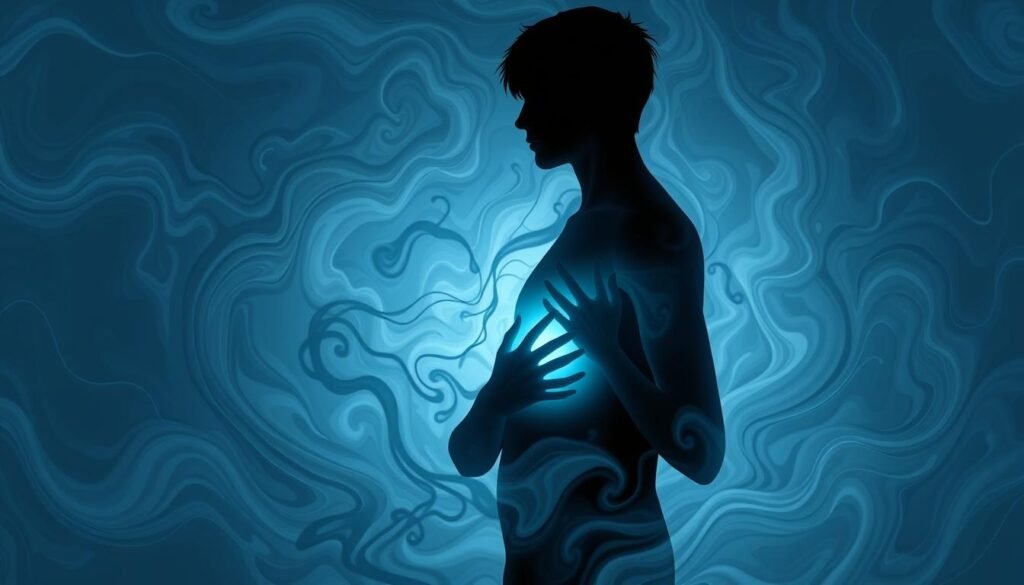Did you know almost 60% of people with anxiety experience numbness or tingling? This shows that anxiety isn’t just in your head. It affects your body too. Understanding anxiety numbness is key. It shows how our mental and physical health are connected.
Those with anxiety often face more than just worry or fear. It’s important to know the physical symptoms of anxiety. This helps us tackle them better. We can also start more helpful discussions on anxiety-related issues.
Key Takeaways
- Anxiety numbness affects around 60% of those with anxiety disorders.
- Numbness shows the strong link between mental health and physical symptoms.
- Recognizing anxiety numbness helps manage symptoms better.
- Physical symptoms of anxiety can make emotional issues worse.
- Understanding these symptoms leads to more supportive talks about anxiety disorders.
What is Anxiety Numbness?
Anxiety numbness involves feelings of less sensation or tingling. It happens during severe anxiety or panic attacks. The body’s response to stress causes these feelings by changing how nerves work and blood flows. People often feel it in the face, hands, feet, arms, and legs.
It’s crucial to know about this when looking at anxiety symptoms. This helps tell the difference between anxiety and other medical problems.
Many people feel a tingling in their face. This is because there are many nerves there. This feeling can also move to hands, fingers, toes, and other body parts like the chest and heart area. However, numbness from anxiety is generally safe and short-lived. Yet, it can make feelings of anxiety worse.
Anxiety numbness can feel like tingling, pins and needles, or prickling. Sometimes, you might feel emotionally numb for a longer time. This can make you feel empty or detached. To deal with these symptoms, it’s good to try deep breathing and distractions.
| Body Part Affected | Common Sensation | Duration |
|---|---|---|
| Face | Tingling | Minutes to hours |
| Hands and Fingers | Numbness, Pins and Needles | Minutes to hours |
| Feet and Toes | Tingling, Numbness | Minutes to hours |
| Arms and Legs | Prickling | Minutes to hours |
| Chest and Heart Area | Tightness or Discomfort | Minutes to hours |
How Does Anxiety Cause Numbness?
Anxiety can cause different physical signs, including anxiety numbness. Stress triggers the body’s stress response. This activates the sympathetic nervous system. It releases hormones like adrenaline and cortisol, causing numbness.
When you get anxious, your body’s fight or flight response activates. This makes blood vessels narrow, reducing blood flow, especially to the hands and feet. It can lead to tingling sensations. Anxiety also often leads to hyperventilation, making the numbness worse. This is because less oxygen reaches your fingers and toes.
In panic attacks, sudden tingling can happen on both sides of the body. This feeling usually goes away when the panic does. But if numbness doesn’t go away, it might be something else. Then, seeing a doctor is important.
Emotional numbness can also come from anxiety. People may feel less joy as a way to handle too much stress. Treatments like Cognitive Behavioral Therapy (CBT) help reduce these feelings. They can make you feel better overall. When anxiety affects your day-to-day, getting help is key. This might mean therapy or even medicine.
To learn more about how anxiety affects the body, you can read about it here.
Physical Symptoms Associated with Anxiety
Anxiety doesn’t just affect the mind; it also causes physical symptoms. It’s important for those dealing with anxiety to recognize these signs. They show how stress impacts the body.
Feeling anxiety can change your body in many ways. This shows the challenge of understanding anxiety fully.
Common Symptoms Beyond Numbness
People with anxiety often feel more than just numb. They experience many physical signs because of their anxiety. These arise when the body prepares to face or escape danger.
This response can lead to symptoms such as:
- Rapid heart rate
- Trembling or shaking
- Muscle tension
- Sweating
- Shortness of breath
- Chest pain
- Nausea or upset stomach
- Feeling dizzy or lightheaded
These ongoing symptoms show how deeply anxiety affects a person. They reflect both physical sensations and emotional stress.
The Connection to Panic Attacks
Panic attacks are intense episodes of fear that come from anxiety. They bring strong physical symptoms with them. These include:
- Numbness or tingling in the extremities
- Heart palpitations
- Chest pain
- Feelings of unreality
- Shortness of breath
- Sweating
Numbness during a panic attack can be scary. It makes people fear they have a serious health issue. Knowing how panic attacks link to these symptoms helps people feel understood. It also encourages them to get the help they need.
Body Parts Affected by Anxiety Numbness
Anxiety can show up in many troubling ways, affecting different body parts. People often feel numb in certain areas because of blood flow and nerve changes. Knowing which body parts are usually impacted can shed light on these sensations, aiding those affected to live better.
Hands and Feet
The hands and feet are typically the first body parts affected by anxiety numbness. When stressed, our body’s “fight or flight” reaction may lead to tingling or a ‘pins and needles’ feel. This is due to blood moving to vital areas for survival. Thus, hands and feet might get less blood, causing them to feel numb.
- Tingling sensations in the fingers and toes
- Feelings of the limbs ‘falling asleep’
- Symmetrical numbness on both sides of the body
Face and Scalp
Anxiety can also affect the face and scalp, causing odd feelings. Nerve-rich and blood vessel-heavy areas are especially prone when anxiety spikes. People might feel a tingling or prickling that increases their distress.
- Prickling sensations in the cheeks or forehead
- Numbness in the scalp, sometimes extending to the neck
- Intensified awareness of these sensations, making anxiety worse

Recognizing these signs can help people understand their anxiety’s physical effects. Anxiety numbness usually goes away after the stressor is gone. However, lasting symptoms might need a doctor’s visit. They can be eased with treatments and self-care practices.
The Duration of Anxiety Numbness
Anxiety numbness usually lasts from a few minutes to several hours. The length of time you feel numb can depend on how severe your anxiety is and how you handle stress. Often, feeling numb means your body is responding to too much stress, which can make it last longer.
If you often feel numb, it’s a good idea to check on your anxiety levels. Learning how to deal with stress better can help your episodes of numbness happen less often. Eventually, you might not feel numb anymore.
Knowing how stress affects your body is key to managing anxiety. When you get the right help and support, you can lessen symptoms like numbness. This makes your life better.
| Duration of Numbness | Typical Factors Influencing Duration |
|---|---|
| Few Minutes | Light anxiety, effective coping strategies |
| Several Hours | Moderate to severe anxiety, lack of coping mechanisms |
| Multiple Hours | Severe anxiety episodes, chronic stress |
Finding out what triggers your anxiety numbness helps. Things like hormone changes or breathing too fast can trigger it. By figuring out what stresses you, you can find better ways to cope. This reduces how often and how long you feel anxious.
Why Anxiety Numbness Can Be Alarming
Anxiety numbness often feels scary, especially when it feels like a serious health issue. People with this problem might find it very disturbing. They usually feel a tingling like pins and needles, especially in their head. This can really stress someone out.

Some people worry they are having a heart attack or stroke when they feel numb. Anxiety can also cause numbness in the hands and face. This happens because stress hormones make blood vessels tight, which cuts down blood flow. So, it’s important to know that anxiety can cause this numbness.
Many things can make anxiety-related numbness worse, such as genetics and what’s happening around us. If anxiety or stress doesn’t get better, it might lead to bigger problems. This can really affect someone’s life and make them feel even more stressed.
Knowing more about anxiety numbness can help people deal with it better. Realizing that these feelings are usually not dangerous can lift a big weight off their shoulders. This makes it easier to talk about and improve overall health.
Different Types of Anxiety Disorders
Anxiety disorders impact our lives deeply. There are several, each with its own signs. Generalized Anxiety Disorder (GAD) means worrying too much about daily things. Panic Disorder brings sudden, strong fear with symptoms like a fast heartbeat and feeling dizzy.
Social Anxiety Disorder makes feeling overly self-aware in social places tough. Specific Phobias cause great fear about certain things or situations, affecting 8-12% of people in the U.S. Agoraphobia is rarer, hitting 1-1.7% worldwide, but it can stop people from going out.
Understanding these disorders helps in getting the right diagnosis and treatment. Treatment often includes therapy, such as cognitive behavioral therapy (CBT), and medication. Doctors may prescribe antidepressants to ease symptoms. It’s said that 30% of U.S. adults will face an anxiety disorder. This highlights why knowing and acting early matters.
| Type of Anxiety Disorder | Prevalence | Main Symptoms |
|---|---|---|
| Generalized Anxiety Disorder (GAD) | 2.9% (adults) | Excessive worrying, restlessness, fatigue |
| Panic Disorder | 2-3% | Panic attacks, racing heart, dizziness |
| Social Anxiety Disorder | 7% | Intense fear of social situations, avoidance behavior |
| Specific Phobias | 8-12% | Intense fear of specific objects/situations |
| Agoraphobia | 1-1.7% | Fear of being in situations where escape is difficult |
Understanding different anxiety disorders is key. It helps people seek the right support and find ways to manage their health.
Treatment Options for Anxiety Numbness
Various treatments can help people deal with anxiety numbness. These treatments work to improve mental health and reduce symptoms. They tackle managing anxiety in different ways.
Cognitive Behavioral Therapy
Cognitive Behavioral Therapy (CBT) is very helpful for anxiety. It teaches people to see and change negative thoughts. This change helps handle stress better.
CBT also helps people develop ways to cope with numbness from anxiety. It includes facing fears. This can make emotional control better over time.
Mindfulness Techniques
Mindfulness is great for dealing with anxiety symptoms. It uses meditation, deep breathing, and guided imagery. These help people focus on now, easing anxiety and numbness.
With regular use, mindfulness lowers symptoms and increases calm. It helps people handle daily problems more easily.
| Treatment Option | Benefits | Considerations |
|---|---|---|
| Cognitive Behavioral Therapy | Identifies negative thoughts; teaches coping strategies | Requires commitment and practice |
| Mindfulness Techniques | Promotes present-moment awareness; reduces stress | May take time to see results |
Stress Management Techniques for Relieving Numbness
Managing anxiety and its symptoms needs effective strategies. Regular physical exercise is key to better mental health. It helps by boosting endorphins through activities like jogging, dancing, or yoga. This provides natural anxiety relief. Mindfulness techniques, including meditation or mindful breathing, help people stay present. This makes it easier to handle stress.
Relaxation activities are also crucial. Techniques like progressive muscle relaxation and guided imagery help in stress reduction. They also improve emotional regulation. Ensuring enough sleep is equally vital for mental health. Strive for 7-9 hours of sleep every night. It sharpens focus and increases motivation.
To provide a clearer picture of various strategies and their benefits, the following table summarizes different anxiety relief strategies and their impacts:
| Strategy | Benefits |
|---|---|
| Regular Exercise | Reduces anxiety, releases endorphins |
| Mindfulness Techniques | Promotes relaxation, manages acute episodes of numbness |
| Relaxation Exercises | Enhances emotional regulation, decreases stress |
| Sufficient Sleep | Boosts focus and motivation, improves emotional well-being |
Reaching out for social support helps with emotional numbness. Enjoyable activities make a big difference, too. They strengthen mental resilience. Want more ideas on stress management? Check out this resource for more methods. Using a mix of approaches helps people find what works for them.
The Importance of Seeking Medical Help
When you feel constant anxiety and numbness, seeking medical help is key to getting better. Knowing that symptoms like numbness and emotional upset are serious matters. By seeing a doctor, you get the right diagnosis. This helps create a treatment plan that really works for you, tackling both your mind and body issues.

About 4-6% of people have health anxiety. It can make day-to-day life hard. Some people visit doctors often, but don’t find relief. They end up in a loop of fear and tests. This shows how crucial it is for treatment to be handled with care. It helps people face their worries instead of running from them.
Numb feelings can scare people into thinking they have serious health problems. Doctors can check and often find it’s just anxiety. Anxiety can cause numbness but it’s usually not a crisis. Still, if numbness doesn’t go away or if it comes with scary symptoms like chest pain, you should get help.
| Symptom | Recommended Action |
|---|---|
| Persistent Numbness | Seek medical evaluation to rule out other causes. |
| Severe Anxiety Symptoms | Consult a healthcare professional for tailored treatment plans. |
| Accompanying Symptoms (e.g., chest pain) | Go to the emergency room immediately. |
| Emotional Numbness | Consider therapy, such as Cognitive Behavioral Therapy. |
It’s really important to understand why seeking medical help matters. It helps you look after both your mental and physical health better. This can make a big difference in your quality of life.
Conclusion
Anxiety numbness links how we feel physically and mentally. Many people feel tingling, heaviness, or pins and needles, especially in their heads. Recognizing these signs as part of anxiety helps us understand it better and its big impact on our lives.
It’s important to tell apart numbness caused by anxiety from other medical issues. This is because things like genetics or what’s happening around us can play a role. Getting a proper check-up and diagnosis is key. Also, treating anxiety with therapy, staying mindful, and managing stress can really help improve life and feelings.
With over 9.4% of young people facing anxiety disorders, spreading knowledge on how to manage anxiety is crucial. This helps in supporting mental health for everyone. For more info, check out the resources on understanding anxiety symptoms. Also, learn about the differences between anxiety and fear at understanding the differences between these emotions.